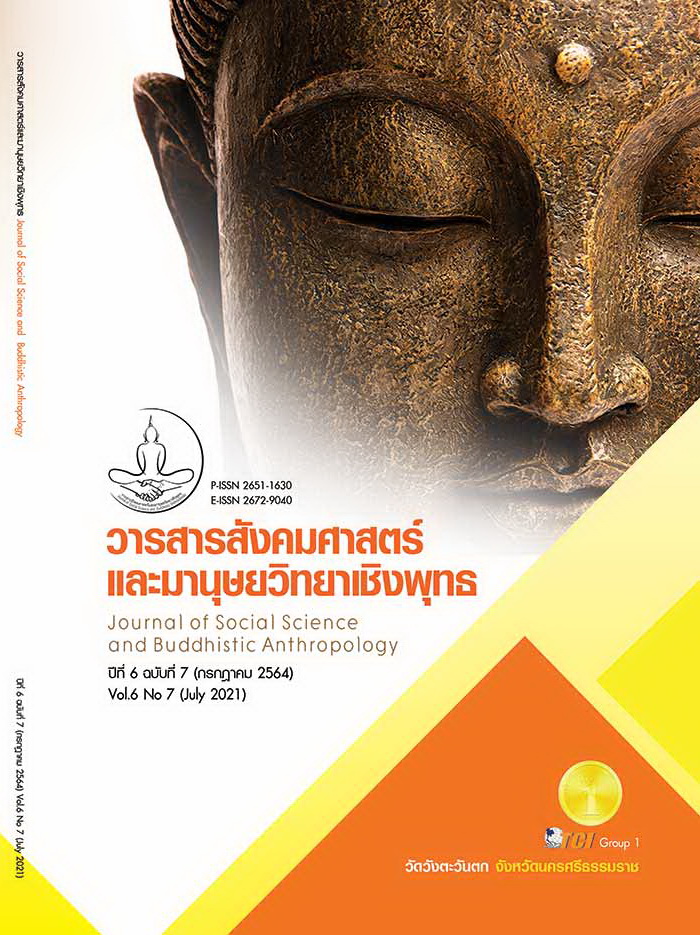THE TEACHINGS OF LOVE FOR YOUR NEIGHBOR IN THE NEW TESTAMENT SCRIPTURE ACCORDING TO THE MODERATE POSTMODERN PHILOSOPHY: AN ANALYTIC, APPRECIATIVE AND APPLICATIVE STUDY
Keywords:
Teaching, Love for Neighbor, New Testament, Moderate Postmodern PhilosophyAbstract
The objectives of this research article were to critically interpret the love for neighbors, according to moderate postmodern philosophy. This research was documentary research which used philosophical methods such as dialectical methods to exchange reasons between the modern philosophical paradigm and the moderate postmodern philosophical paradigm, with the reflexive process in critical thinking to show critical analysis, evaluation of the value and the application and interpreting process with the four Idols of Francis Bacon, Aristotle’s philosophy of happiness according to love in the Greek language in the New Testament with hermeneutics. The research findings showed that the modern paradigm had the opinion that the love for the neighbor should be interpreted to make the meaning of the word clear and using the ordinary language for the practice right to the expression of love as agape for the neighbor and followed in the traditional teachings. Whereas it was also weak, that was the modern philosophical paradigm still had the attachment in the language. So the moderated postmodern philosophical paradigm promoted the fusion of the horizons from text interpretation and the explaining of the love for neighbor in Christianity to express the sophisticated, that the Lord did not definite the neighbor just only the ordinary understanding or common definition only but He also mean to the people who need care, love, and need help in any dimensions, loving for the neighbor should be done to neighbors, whether near or far, in order to make peace according to the goal of the moderate postmodern philosophical paradigm. The findings of the research can be used in the explanation and be a mean of the love for neighbor friendlier, even the same religion or not, no relevance persons and even though the enemy that willing to harm us, that all were friendlier in the purpose to reflect the meaning of love.
References
กีรติ บุญเจือ. (2560ก). ปรัชญาหลังนวยุค. กรุงเทพมหานคร: ดวงกมล.
กีรติ บุญเจือ. (2560ข). ปรัชญาอรรถปริวรรตในปรัชญา ศาสนาและจริยศาสตร์. กรุงเทพมหานคร: มหาวิทยาลัยราชภัฎสวนสุนันทา.
จิรโชค วีระสย. (2562). ปรัชญาเชิงศาสตร์ การเปลี่ยนแปลงทางสังคมวัฒนธรรมและการปรับเปลี่ยนกระบวนทัศน์. เรียกใช้เมื่อ 28 มกราคม 2563 จาก http://www.phd. ru.ac.th. เอกสารประกอบการบรรยายวิชาขอบเขตและวิธีการศึกษา 9902
พระครูปริยัติกิจจาภิรม (กระจาย รวิวรรณโณ) และคณะ. (2563). การประยุกต์ใช้อรรถปริวรรตของพุทธทาสภิกขุในแนวทางการเสริมสร้างพหุนิยมทางศาสนาในสังคมไทยปัจจุบันเพื่อการอยู่ร่วมกันอย่างสันติ. วารสารสังคมศาสตร์และมานุษยวิทยาเชิงพุทธ, 5(6), 68-77.
ศิลป์ชัย เชาว์เจริญรัตน์. (2008). หลักการตีความหมายพระคัมภีร์และการประยุกต์ใช้อย่างถูกต้อง. (พิมพ์ครั้งที่ 2). กรุงเทพมหานคร: สถาบันคริสเตียนศึกษาและพัฒนาคริสตจักร.
สมาคมพระคริสต์ธรรมไทย. (2554). พระคริสต์ธรรมคัมภีร์ ฉบับมาตรฐาน 2011. กรุงเทพมหานคร: สมาคมพระคริสต์ธรรมไทย.
Bunchua, K. (2014). 84,000 Dhamma khandhas are for school, not for educators. SSRU Graduat Studies Journal, 7(1), 1-14.
David, N. F. (1992). The Anchor Bible Dictionary volume4 K-N. New York: Doubleday.
Dodd, C. H. (1961). The parable of the kingdom. New York: Charles Scribner’s Sons.
Greenfield, E. A. & Reyes, L. (2015). Continuity and change in relationships with neighbors: Implications for psychological well-being in middle and later life. J Gerontol B Psychol Sci Soc Sci. 2015, 70(4), 607–618.
Hunter, A. M. (1960). Interpreting the Parable. London: Cambridge University Press.
O’Campo, P. (2015). The neighbourhood effects on health and well-being (NEHW) study. Health & Place, 31(1), 65-74.









